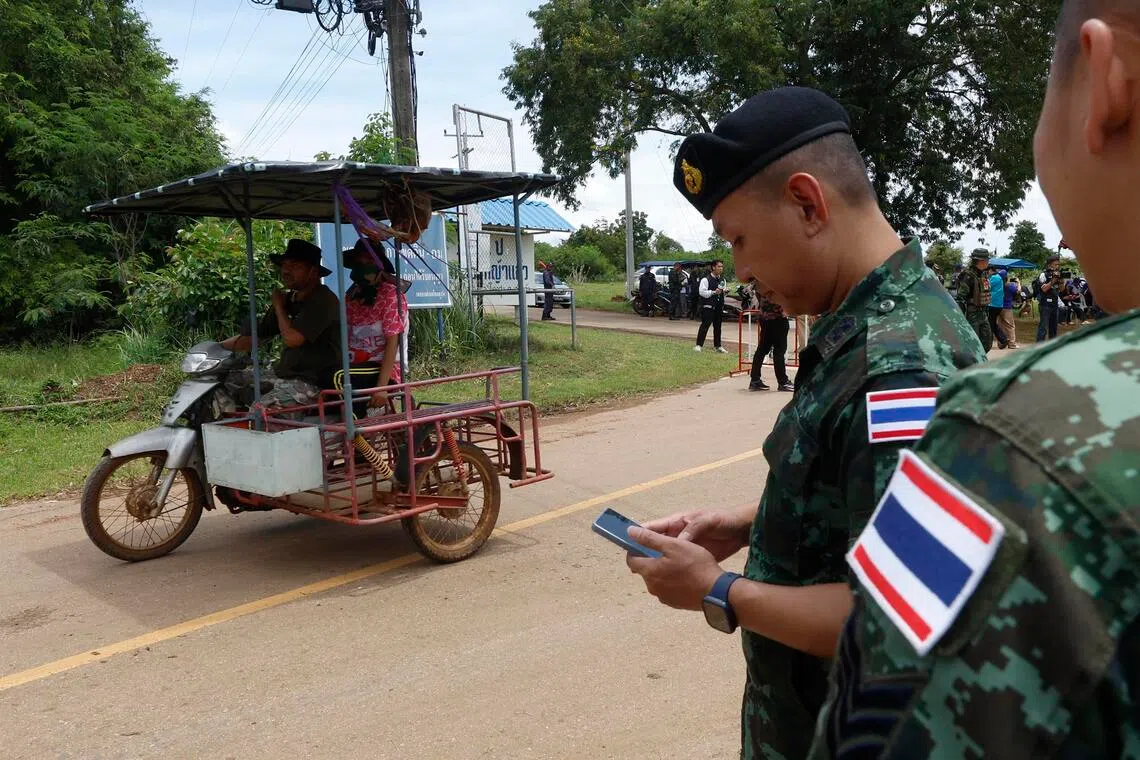Cambodia objects to Thai army warnings of legal penalties on Cambodian citizens
Sign up now: Get insights on Asia's fast-moving developments

The Thai army had warned Cambodians of jail time or even the death penalty for “acts against Thai sovereignty”.
PHOTO: EPA
Follow topic:
PHNOM PENH – Cambodia has issued a formal objection to Thailand’s intentions to impose its domestic laws on the Cambodian nationals living in the border areas, describing the move as a violation of international law and an escalation of tensions along the disputed frontier.
“Cambodia condemned threats made by Thailand’s First Military Region, which warned it will apply Thai law against Cambodian nationals in Chouk Chey and Prey Chan villages of O’Bei Chorn commune, O’Chrov district, Banteay Meanchey province,” said its Ministry of Foreign Affairs and International Cooperation on Sept 20.
On Sept 18, the Royal Thai Army outlined in a statement legal penalties for Cambodians who cause disturbances in Thai territory, following a clash at Ban Nong Ya Kaew in Sa Kaeo Province a day earlier.
They warned of the possibility of life imprisonment or even the death penalty for what they have referred to as “acts against Thai sovereignty”.
The Cambodian government said tear gas and rubber bullets were fired at Cambodian villagers in Prey Chan during the clashes on Sept 17, and its Foreign Affairs Ministry called the incident “an attempt to exert territorial sovereignty by force”.
“Thailand’s assertion of domestic law in disputed territory circumvents fundamental obligations under the (United Nations) Charter, which prohibits the use of force against another state’s territorial integrity,” the statement read.
It added that the imposition of severe criminal penalties on Cambodian nationals engaged in peaceful protest would constitute “a grave violation of fundamental human rights guaranteed under international law”.
The ministry stressed that such actions violate the freedom of peaceful assembly and association as enshrined in the Universal Declaration of Human Rights and the International Covenant on Civil and Political Rights, to which Thailand is a party.
It further accused Thailand of breaching the Asean Charter and the Treaty of Amity and Cooperation, which obliges member states to refrain from provocative acts and settle disputes peacefully.
Cambodia also reiterated its position that borders cannot be changed by force, rejecting any attempt by Thailand to justify its actions under domestic law.
“Thailand’s intention to enforce its domestic law on Cambodian nationals peacefully protesting is a clear demonstration of its use of force to assert sovereignty over an area that has not yet been demarcated,” the statement said.
The ministry called on Thailand to cease all activities that undermine de-escalation efforts, urging respect for the Ceasefire Agreement of July 28 and the Agreed Minutes of the General Border Committee meetings of Aug 7 and Sept 10.
“The Royal Government of Cambodia remains resolute in upholding its principled position that borders must not be changed by force,” the statement concluded, while reaffirming its commitment to peaceful negotiations and international law. THE PHNOM PENH POST/ASIA NEWS NETWORK

